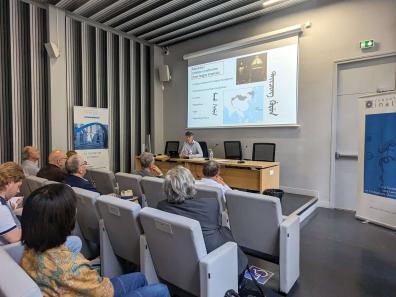Conference "Manchu - Formation and extinction of an imperial language. A thousand years of geopolitics and linguistics between the rivers Amur and Ili".

Nicolas Fondraz has worked for the French Ministry of Europe and Foreign Affairs. Until 2022, he was Director of International Institutional Relations at TotalEnergies. He has served in Beijing, Singapore, Luanda and Moscow. He is currently President of the Association Technique Energie Environnement (ATEE), and his hobby is the translation of Chinese and Manchu texts.
Nicolas Fondraz is an alumnus of Inalco (Chinese).
The conference "Manchu - Formation and extinction of an imperial language. A thousand years of geopolitics and linguistics between the rivers Amour and Ili"
This lecture explored the astonishing destiny of Manchu. How the language of a small Tungus population living along the Amour River became the language of the Qing Empire, the last Chinese dynasty, before disappearing in Manchuria to survive only within a national minority of the People's Republic of China, in Xinjiang, along the Ili River, on the border with Kazakhstan.
In fact, Nicolas Fondraz recalled that the last dynasty to administer the Chinese Empire, that of the Qing (1644-1912), was Manchu. If this ethnic group managed to remain in power for several centuries, its cultural and linguistic heritage should have left more traces in contemporary China. However, despite its status as the official language of the Chinese Empire, accompanying military conquests and diplomacy - treaties defining the borders between China, Russia and Mongolia were drafted in Manchu rather than Chinese - Manchu gradually faded away among the Manchus of China as an oral language, surviving only as a written administrative language until the end of the dynasty. The Manchus, a minority in the world's most populous empire - there was one Manchu for every 350 Chinese at the time - became sinicized. At court, the language ceased to be spoken in the mid-19th century. Even the historic Manchu territory became Sinicized in the late 19th and early 20th centuries. So what remains of the Manchus today? Nicolas Fondraz explains, "There remains a national minority, the Xibe, who currently live in Xinjiang and are descendants of the Manchus."
